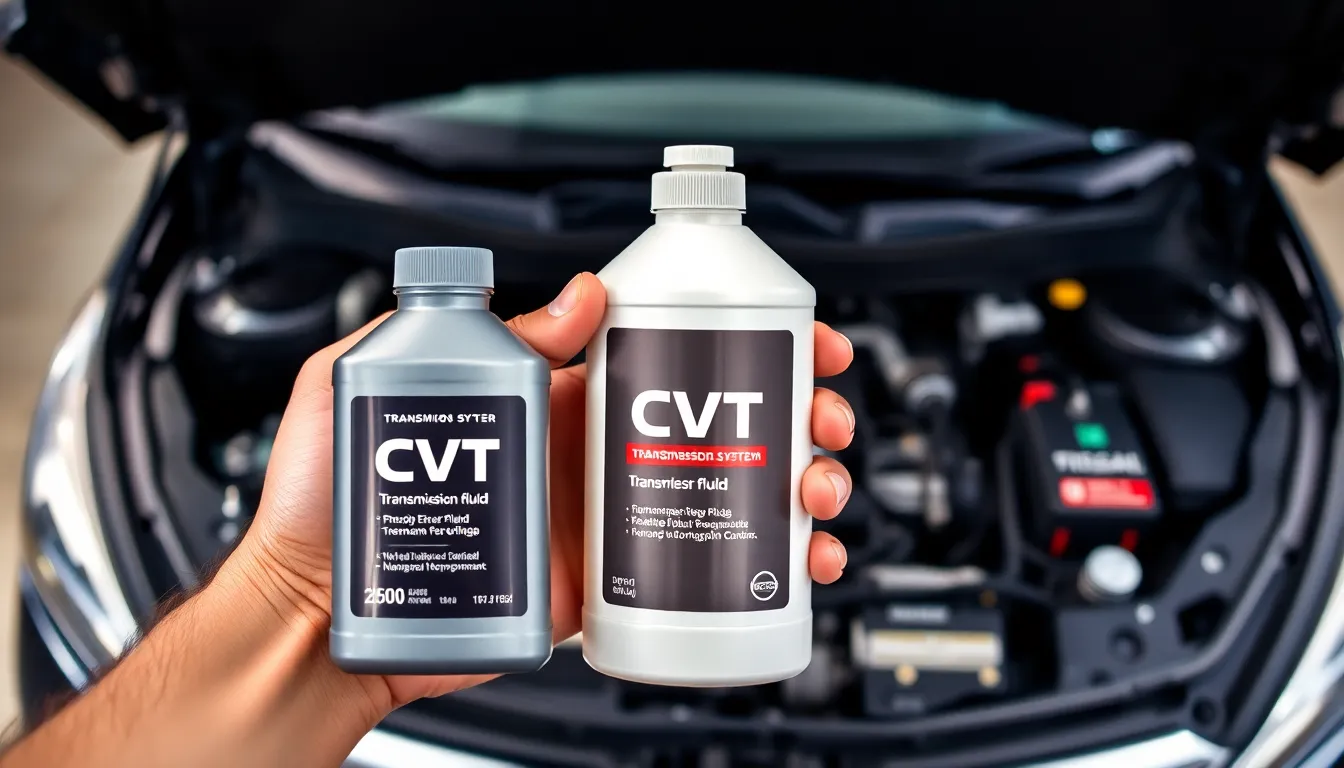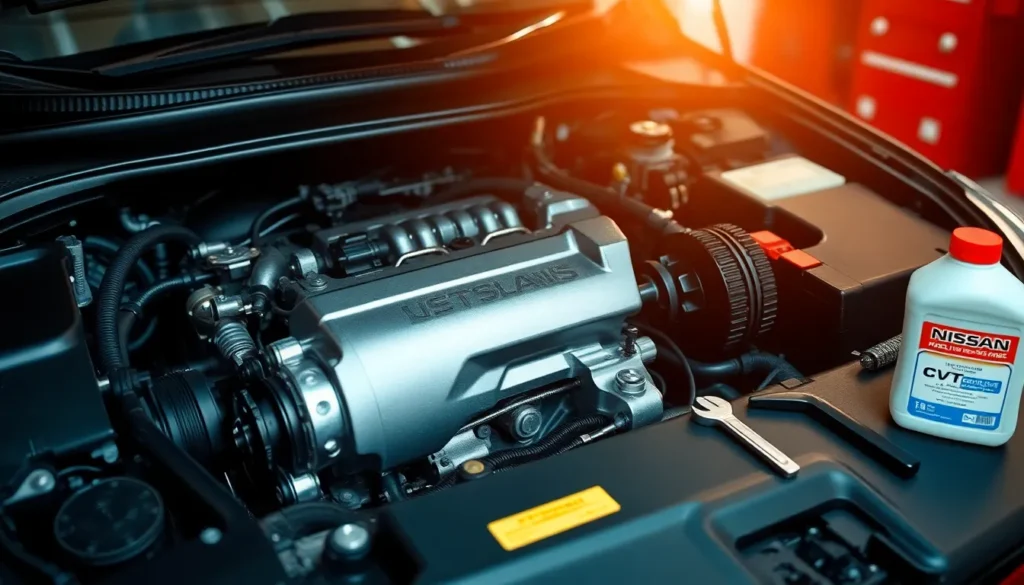When it comes to maintaining a Nissan, understanding the cost of a CVT transmission fluid change is essential. The continuously variable transmission (CVT) offers a smooth driving experience, but it requires specific care to ensure longevity and performance. Neglecting fluid changes can lead to costly repairs down the road.
Many Nissan owners wonder about the expenses involved in this maintenance task. Factors like the model year, service location, and whether the fluid is changed at a dealership or an independent shop can all influence the final price. Knowing what to expect can help drivers make informed decisions and keep their vehicles running smoothly.
Table of Contents
ToggleUnderstanding Nissan CVT Transmission
Nissan’s Continuously Variable Transmission (CVT) offers a seamless driving experience through its unique design, which uses a belt and pulley system instead of traditional gears. This transmission type enhances fuel efficiency while providing smooth acceleration and deceleration.
Nissan recommends using specific CVT transmission fluid to maintain optimal function. This fluid is essential for lubrication, cooling, and the hydraulic elements of the CVT system. Neglecting to change the fluid as per the manufacturer’s guidelines can lead to reduced performance and potential damage.
Thousands of Nissan vehicles rely on CVT technology. Common models include the Nissan Altima, Sentra, and Rogue. Each of these models may have different fluid change intervals based on the manufacturer’s maintenance schedule. Typically, a fluid change occurs every 30,000 to 60,000 miles, depending on driving conditions and model specifics.
Understanding signs of CVT fluid issues is crucial for vehicle upkeep. Symptoms such as slipping, hesitations, or unusual noises when shifting gears often indicate the need for a fluid change. Regular maintenance helps prevent more significant issues and extends the lifespan of the transmission.
Nissan’s comprehensive maintenance approach ensures drivers receive the best performance from their vehicles. It includes routine inspections and fluid changes, aiding in identifying potential concerns early, thus minimizing costly repairs.
Importance of CVT Transmission Fluid

CVT transmission fluid plays a crucial role in maintaining the performance of Nissan’s Continuously Variable Transmission. Proper fluid maintenance ensures efficiency, longevity, and optimal drivability.
Function of Transmission Fluid
Transmission fluid provides lubrication to reduce friction between moving parts. It cools the transmission by dissipating heat generated during operation. The fluid also enables proper hydraulic function, facilitating smooth gear shifts. Additionally, it cleans the transmission by carrying away contaminants and debris, preventing damage to internal components. Each function contributes to the overall health of the CVT system.
Signs of Low or Dirty Fluid
Low or dirty transmission fluid can lead to several noticeable issues. Symptoms may include:
- Slipping gears: Difficulty maintaining various speeds or inconsistent engagement of the transmission.
- Unusual noises: Grinding, whining, or clunking sounds indicating mechanical issues.
- Overheating: Higher engine temperatures can result from inadequate cooling due to dirty fluid.
- Delayed shifting: Lagging or hesitating when changing gears signals potential fluid problems.
- Discolored fluid: Dark brown or burnt smelling fluid indicates contamination or wear.
Recognizing these signs early helps prevent major repairs and maintains CVT efficiency.
Cost Breakdown of CVT Transmission Fluid Change
Understanding the cost associated with changing Nissan’s CVT transmission fluid provides essential insight for vehicle owners. The costs can vary based on several factors, including service location and labor rates.
Average Cost of Fluid Change
The average cost for a CVT transmission fluid change ranges from $150 to $300. This price typically includes both the fluid and labor charges. Dealerships may charge on the higher end, while independent shops often offer more competitive pricing. Variations in cost also depend on specific Nissan models, with some requiring more fluid than others.
Additional Costs to Consider
Additional expenses can occur during the fluid change process:
- Fluid Cost: Nissan CVT fluid typically costs $15 to $25 per quart, with most service requiring 4 to 10 quarts.
- Labor Charges: Labor costs vary, averaging between $75 and $150 per hour, depending on location and technician expertise.
- Diagnostic Fees: If a vehicle shows symptoms of transmission issues, diagnostic fees may range from $100 to $150 additional.
- Environmental Fees: Some shops charge an environmental disposal fee, usually around $10 to $20.
- Accessory Replacement: If necessary, replacing a filter or pan gasket can add $50 to $150 to the total cost.
Being aware of these costs enables Nissan owners to budget effectively for essential maintenance, keeping their vehicles in optimal condition.
DIY vs. Professional Fluid Change
Choosing between a DIY fluid change and hiring a professional involves weighing the potential benefits and drawbacks of each option. Both methods can effectively maintain a Nissan’s CVT, but decision factors vary based on skill level, equipment, and cost considerations.
Pros and Cons of DIY
Pros of DIY
- Cost savings: Performing the fluid change independently eliminates labor fees, potentially lowering overall costs.
- Control over materials: DIYers can choose high-quality fluids that meet Nissan specifications.
- Learning experience: Completing the job enhances understanding of the CVT system and builds car maintenance skills.
Cons of DIY
- Time investment: The process can require several hours, especially without prior experience.
- Equipment requirement: Necessary tools, including wrenches and fluid pumps, might add to initial costs.
- Risk of errors: Mistakes during the process may lead to improper fluid levels, resulting in vehicle performance issues or damage.
When to Seek Professional Help
Technical expertise: Professional technicians possess specialized knowledge and equipment required for comprehensive fluid changes.
Warranty concerns: If the vehicle is still under warranty, using a professional service protects coverage related to transmission issues.
Complex issues: If symptoms of CVT problems exist (e.g., slipping or overheating), seeking professional help ensures proper diagnosis and mitigation.
Time constraints: For those with limited free time, professional services offer efficiency and convenience, allowing quick vehicle turnaround.
Understanding the cost of changing Nissan’s CVT transmission fluid is essential for maintaining vehicle performance. With prices typically ranging from $150 to $300, Nissan owners can budget accordingly for this necessary service. Recognizing the signs of fluid issues can prevent costly repairs and enhance the longevity of the transmission.
Whether opting for a DIY approach or professional service, being informed about the process and costs involved empowers owners to make the best choices for their vehicles. By prioritizing regular maintenance and fluid changes, they can ensure their Nissan continues to provide a smooth and efficient driving experience for years to come.





